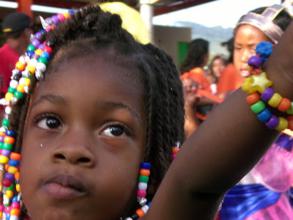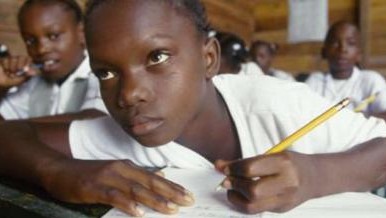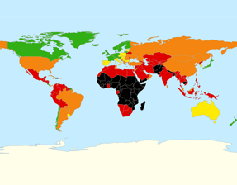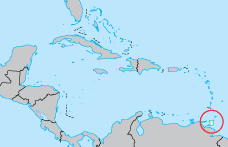Children of Trinidad and Tobago
Realizing Children’s Rights in Trinidad and Tobago
A Caribbean country, Trinidad and Tobago is a former Spanish then British colony which obtained its independence in 1962. We can also recognize certain similarities between the British system and that of this country. In spite of hope of economic growth via gas and oil exports, Trinidad and Tobago has experienced a degradation of its social conditions, gradually leading to poverty.
Population: 1.2 million Life expectancy: 69,9 years |
Main problems faced by children in Trinidad and Tobago:
Due to a growth in the energy sector (oil and gas), Trinidad and Tobago has experienced strong economic growth since 1994. Nevertheless, poverty is still present since in 2005, 26% of the population lived on less than $2.75 per day.
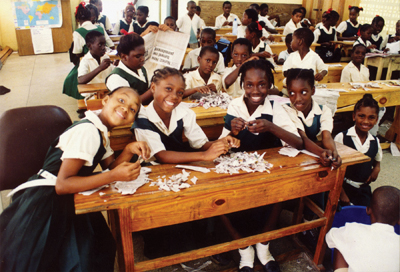 School is obligatory and free in Trinidad and Tobago for children between 5 and 16 years. Contrary to other countries in the area, Trinidad and Tobago provides free transport, books, and meals which has resulted in the highest rate of elimination of illiteracy in the area (98%).
School is obligatory and free in Trinidad and Tobago for children between 5 and 16 years. Contrary to other countries in the area, Trinidad and Tobago provides free transport, books, and meals which has resulted in the highest rate of elimination of illiteracy in the area (98%).
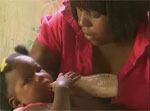 The situation regarding access to health care is alarming in Trindad and Tobago. Indeed, in 2010, the rate of infant mortality (meaning children less than one year old) was 24% while the death rate for those under 5 years old was 27%. Moreover, the increasingly growing number of teenage mothers is worrying the authorities more and more.
The situation regarding access to health care is alarming in Trindad and Tobago. Indeed, in 2010, the rate of infant mortality (meaning children less than one year old) was 24% while the death rate for those under 5 years old was 27%. Moreover, the increasingly growing number of teenage mothers is worrying the authorities more and more.
The Caribbean area is the second most affected by the AIDS virus. According to a UNAIDS study, from the moment when the virus was discovered in Trinidad and Tobago in 1983 up until 2005, 15,940 people were diagnosed with the virus. According to the Caribbean epidemiologic center, in 2004, 5% of children aged 0-4 years and 1% of children up to 14 years were victims.
The government passed a “Domestic Violence Act” which provides a certain level of protection for children who experience violence in their homes. Indeed, young people are often vulnerable and can experience rape, physical abuse, drug use, or living situations where parents are under the influence of drugs or committing crimes.
The NGO Amnesty International estimated that 482 cases of rape, incest, and other sexual crimes had been announced between January and September 2010. The NGO then denounced bad conditions of access to justice for the victims of these crimes.
Although the minimum legal age to marry is 18, in practice, it is the regions that determine the age according to religious principles, leading to certain irregularities. For example, according to the “Muslim Marriage and Divorce Act”, the minimum lawful age is 16 years for men and 12 years for women. According to the Hindu religion, the ages are 18 and 16 years respectively.
The law authorizes the private and public sectors to employ young people from the age of 16 years. Children aged from 14 to 16 years can however work in family businesses. Children under 18 years old cannot work between 10 pm and 5 am except in family businesses.
Although the government passed many measures in order to eliminate human trafficking, it is clear that Trinidad and Tobago does not respect all of the standards in place. Also, as the Office of the United Nations High Commissioner for Refugees states, it is a place of crossing, of transit, and at the same time a destination of persistent sexual trafficking and forced labor. Girls from Latin America and the Dominican Republic, for example, are very often victims of sexual trafficking and are can be found in clubs or hotels in Trinidad and Tobago. Homeless children who live in the street are also prone to this type of trafficking and can sometimes be pulled into criminal vocatoin trafficking.
There is an increasing number of children living in the streets of Trinidad and Tobago. However, no correct figure can be given because of their mobility, in particular between Port of Spain and other cities. These children are often involved in illegal activities such as drug trafficking or prostitution. Qualified organizations have been able to determine that more and more children living in the street have been infected with AIDS.
Crime
Trinidad and Tobago have poor safety conditions. Indeed, gang activity, during the day and night, as well as physical violence in particular towards tourists is increasing more and more. Children living in the streets face significant insecurity and sometimes become criminals themselves.

